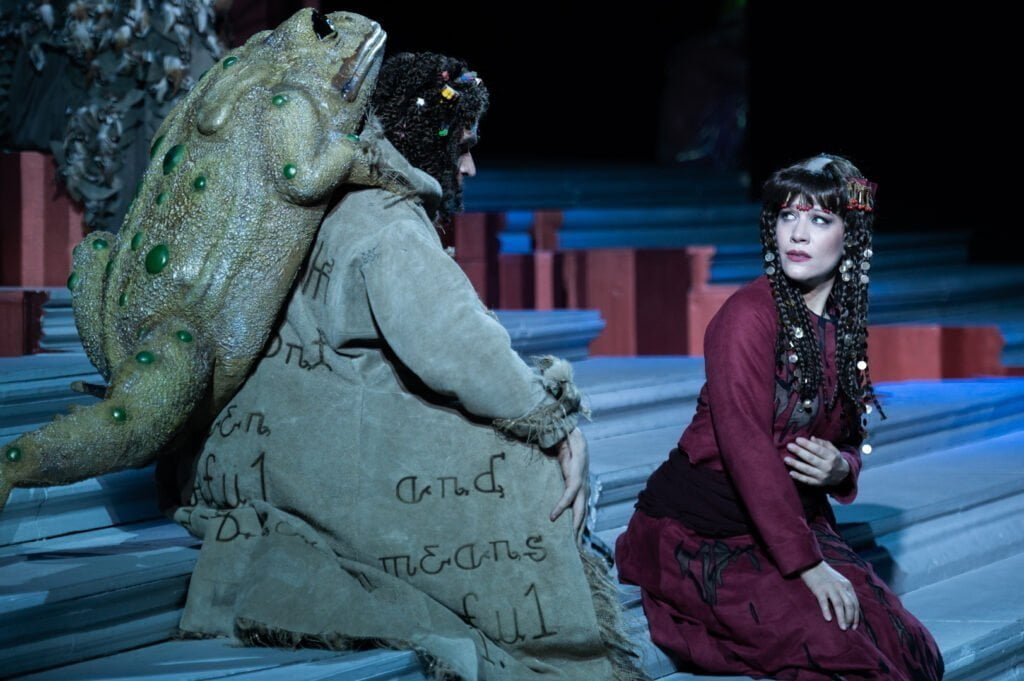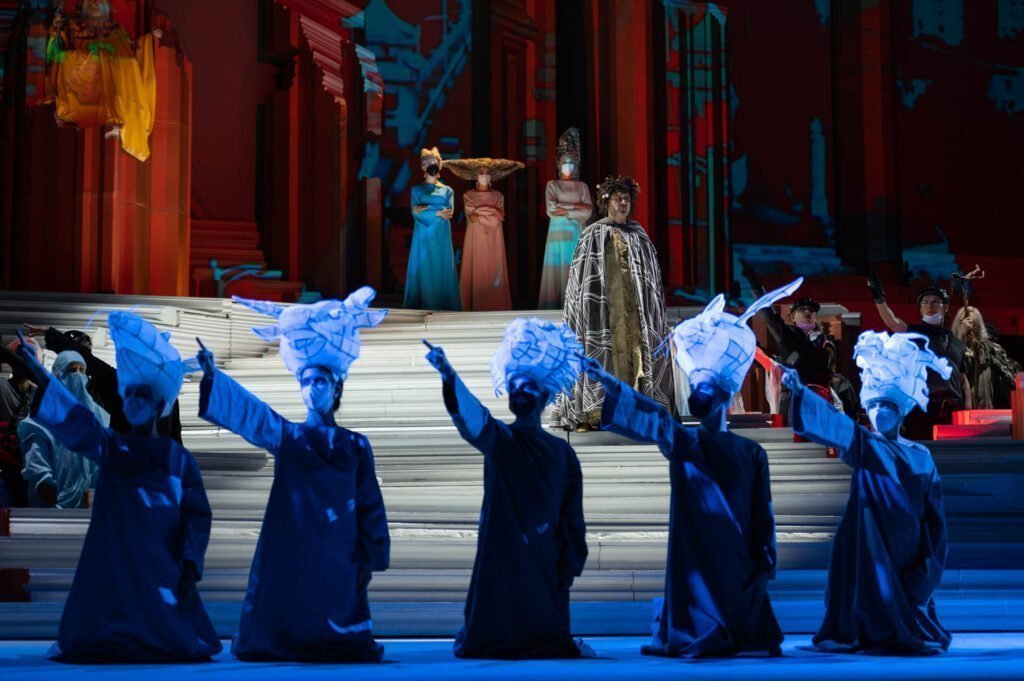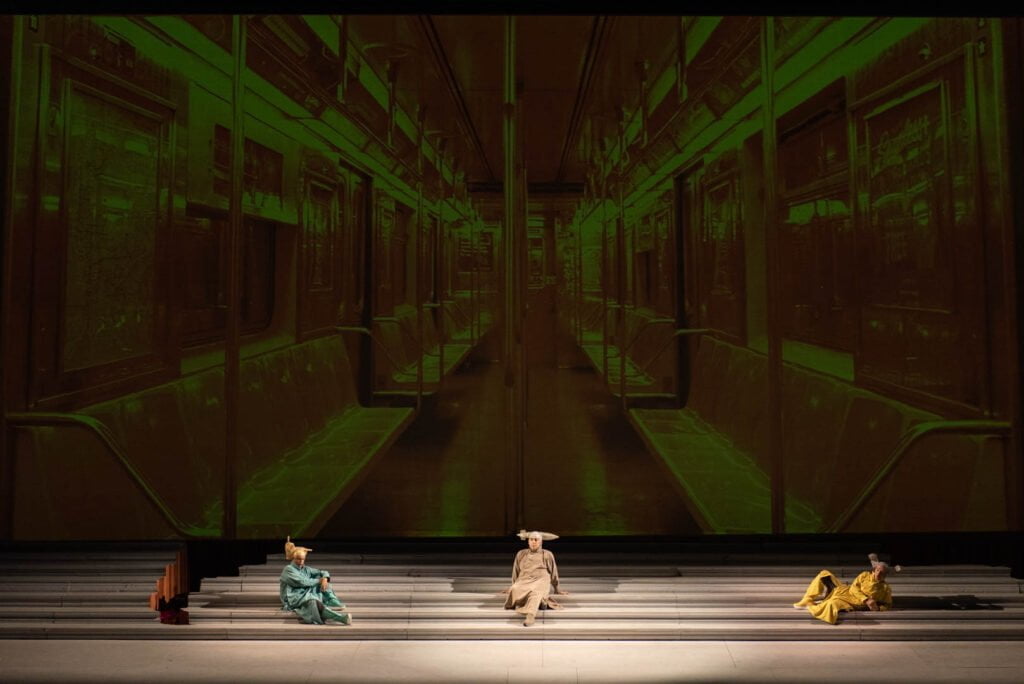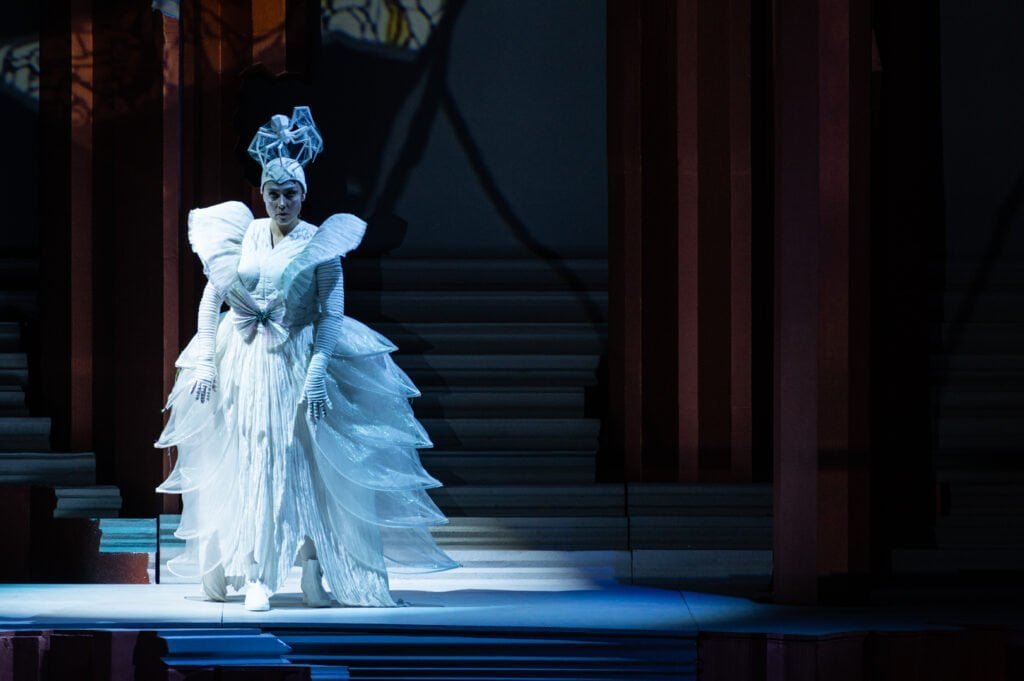Turandot by Giacomo Puccini. Lyric Drama in Three Acts and Five Scenes. Libretto by Giuseppe Adami and Renato Simoni. First performed, Teatro alla Scala in Milan, April 25, 1926.
Attended: March 24, 2022.
Conductor: Oksana Lyniv
Director: Ai Weiwei
Chorus Master: Roberto Gabbiani
Princess Turandot: Oksana Dyka
The Emperor Altoum: Rodrigo Ortiz
Timur: Antonio Di Matteo
The Unknown Prince (Calaf): Michael Fabiano
Liú: Francesca Dotto
Ping: Alessio Verna
Pang: Enrico Iviglia
Pong: Pietro Picone
A Mandarin: Andrii Ganchuk
Prince Of Persia: Chao Hsin
Principe Of Persia (Voice): Giuseppe Ruggiero
Teatro Dell’opera Di Roma Orchestra And Chorus
The Teatro Dell’opera Di Roma Scuola Di Canto Corale
Music: 3,5***
Staging: 1*
From the 22nd to the 31st of March 2022 the Teatro dell’Opera di Roma is staging Turandot, one of the most performed operas in the world. The main feature of this edition is ending the story with Liù’s death (the last scene composed by Puccini before his death), which is the same choice that was made in the very first performance, conducted by Toscanini in 1926. By keeping the script close to the original version, the main dramaturgical problem of the opera, Turandot’s sudden change of heart, is thus solved, or even better, avoided. In recent years, it has not been rare to see alternative endings, as, for instance in Luciano Berio’s latest version of the opera composed in 2001. From a musical point of view, however, the finale Franco Alfano originally composed to complete the score is probably the most satisfactory, as far as an opera completed after the author’s death can be. So, the choice to stop the music at the point where Puccini left it is possibly the only alternative that makes sense.
The other element of interest in this edition is the presence of the Ukrainian conductor Oksana Lyniv. In an opera like Turandot, the role of the conductor is, of course, especially important. Puccini’s magnificent score is much more than a mere accompaniment to the singers. It calls for an exceptionally large orchestra, which includes extra forces offstage and a huge percussion ensemble, including xylophones (two of them), several Chinese gongs, bells and more. Oksana Lyniv conducted the orchestra with a sure and authoritative hand, presenting at best the impressive tonal variety of the score. She didn’t compromise with the singers by reducing the orchestral dynamic.

In Act 2, at Calaf’s words “ti voglio tutta ardente d’amore”, many tenors usually introduce a high note not present in the original score (and frankly, out of place). Another typical habit is to stop the music after the famous aria “Nessun dorma” to allow the audience to applaud (and sometimes to have an encore). None of this happened, thanks to the impetuous conductor. Perhaps the first act was performed too fast, but overall Oksana Lyniv has given an excellent performance, fully supported by the orchestra of the Rome Opera.
The key role was played by another Ukrainian, the soprano Oksana Dyka, whose vocal means are well suited to the icy Turandot. Her high-pitched voice thrilled the audience, emerging also in the loudest orchestral moments. At the same time, the singer delivered an intimate portrait of the “evil princess,” proving capable of managing even the most delicate moments.
Calaf was performed by Michael Fabiano. The American tenor doesn’t have an enormously powerful voice; however, he gave an acceptable version of the unknown Prince, despite a stage direction that certainly didn’t help him. Francesca Dotto interpreted the young slave Liu well. Her first aria, “Signore ascolta,” was performed with passion, although it was not the best I’ve ever heard. In the third act, the soprano offered a very touching performance, growing in intensity and culminating in her death, which is of course the climax of the story.

Bass Antonio Di Matteo was the old Timur. His last, dramatic intervention in act 3 was unfortunately totally disrupted by the stage direction, as it will be explained later. The three “masks” Ping, Pang and Pong were performed respectively by Alessio Iverna, Enrico Iviglia and Pietro Picone. They provided, overall, an adequate version of the three ministers.

Emperor Altoum was performed by young tenor Rodrigo Ortiz, whose “dark” voice timbre was not suitable for the character, unlike Andrii Ganchuk who was good in his short role as the mandarin.
As usual, the chorus directed by Roberto Gabbiani provided an excellent performance, effectively interpreting the many faces of the Chinese people, from sad to angry, and so on. On this occasion, the white voices of the Rome Opera’s Scuola di Canto Corale were also involved (in the children chorus, in act 1).
We come now to the most problematic aspect of the performance, the staging direction. This was Chinese artist Ai Weiwei’s first attempt as an opera director, and from what we could see, he has already the “destructive potential” to quickly become one of the most sought directors around. Let’s start by looking at his own words: “I’m not a big music listener, I consider music a form of art very far from my sensibility.” This sentence goes a long way to explain the madness we’re about to describe. It’s not possible, really, to review all the absurdities that were shown on the stage: to simply list them would already require several pages. In any case, let us try to give you at least an idea. In all the acts, the stage was filled by a huge staircase, with different geometrical shapes displayed in the background. They resembled futuristic skyscrapers, or maybe, on the contrary, ancient pillars. On the back wall, a screen was constantly showing videos of random images (at least that’s how they seemed to us). Scenes of war, refugees, images related to the pandemic, urban landscapes and more were continuously displayed. The scenes had no synchronization with the music (perhaps it would be asking too much).

Most importantly, they had no connection at all with the opera. Just to give you an idea: during the trio “Ho una casa nell’Honan” (I have a house in Honan) we saw images of Venice! Unfortunately, the disturbing direction was not limited to the projections since nonsensical moments were displayed on stage as well. Again, as an example, in the first act, the unfortunate Calaf had to carry a giant frog on his back! It probably had some hidden meaning, but we weren’t smart enough to understand. Several mimes/dancers were also used from time to time, to add more confusion to the scene, as in the finale, where Liu’s death was overshadowed by a “Michael Jackson-style” ballet. More interesting was the figure of the Prince of Persia, interpreted by Chao Hsin, a traditional Chinese theater performer. It is worth remembering that the director Zhang Yimou introduced in his staging a similar role for Pu Tin Pao (the executioner), who was totally absent in this edition, despite being the only mime expressly requested by the libretto. Conversely, there is little to say about the movements of the singers, as they were practically left to their own devices (which wasn’t a bad thing, after all!). The costumes were more or less in line with the rest of the staging. The three ministers, for example, were wearing strange “hats,” featuring a couple of hands, an airship (or perhaps a missile) and more. As already stated, it would be impossible to report all the absurdity presented. It is not amiss to say that in this version, almost nothing remained of the original Turandot.
At the end, a warm round of applause was given to all the singers, and especially to conductor Oksana Lyniv.

[…] OPERA GAZET: Turandot en Roma. Ai Weiwei: «No soy especialmente melómano» […]
sorry, Oksana the conductor messed up may times, she is too self center and ego and never given singer place to breath properly thus the opera is mechanical!